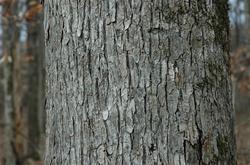 Photo by Laura Cotterman Photo by Laura Cotterman The South’s forests encompass a broad range of ecosystems and landscapes and are home to many rare, threatened, and endemic species of plants and animals. Forest ownership and uses in the South have been changing dramatically in the early 21st century, raising questions about the future of our southern forests. A huge transition in forestland ownership has been occurring, with the forest products industry divesting about three-fourths of its timberland holdings in the southern U.S. in the ten years between 1998 and 2008. What are the implications for forest management and sustainability? How will forest land ownership in the South continue to change in the future? Private landowners hold 86 percent of the forested land in the southern U.S., with two-thirds of this area owned by families or individuals. The average size of family-owned forest holdings is small: only 29 acres (although 60% of family-owned forests exceed 100 acres in size). Two-thirds of these private landowners harvest and sell trees from their land. In recent history, much of the South’s forests were owned by big timber production industries. . . .
1 Comment
Aldo Leopold, father of modern land and wildlife conservation, just before his death in 1948 famously articulated in A Sand County Almanac a new ethic of the land, one that would embrace “an intelligent humility toward man’s place in nature” and a definition of community that expands to include its natural capital, the water and soils, plants and animals, the very land itself.
“Do we not already sing our love for and obligation to the land of the free and the home of the brave?” he asked. “Yes, but just what and whom do we love? Certainly not the soil, which we are sending helter-skelter down river. Certainly not the waters, which we assume have no function except to turn turbines, float barges, and carry off sewage. Certainly not the plants, of which we exterminate whole communities without batting an eye. Certainly not the animals, of which we have already extirpated many of the largest and most beautiful species. A land ethic of course cannot prevent the alteration, management, and us of these ‘resources,’ but it does affirm their right to continued existence, and, at least in spots, their continued existence in a natural state. In short, a land ethic changes the role of Homo sapiens from conqueror of the land-community to plain member and citizen of it. It implies respect for his fellow-members, and also respect for the community as such.” Leopold’s message continues to be just as relevant to us now as it was nearly seventy years ago when he wrote this appeal in his landmark collection of essays. - credit to the Aldo Leopold Foundation and its Leopold Outlook journal (we encourage you to check out www.aldoleopold.org ) |
When we see land as a community to which we belong, we may begin to use it with love and respect.... Conservation, viewed in its entirety, is the slow and laborious unfolding of a new relationship between people and land." There is in fact no distinction between the fate of the land and the fate of the people. When one is abused, the other suffers. From the PresidentSCP President Chuck Roe looked at land conservation along the route of John Muir's "Southern Trek." About ViewpointThis blog offers views of our Board and partners. We invite your viewpoint on the following questions: Archives
April 2024
Categories
All
|

 RSS Feed
RSS Feed